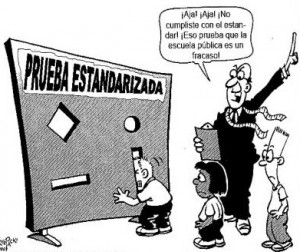Por: Vicki Cobb
I am always looking for topics for this blog about learning that is interesting, exciting and engaging for both teachers and students. Last year I wrote about Ruth Shuman who founded Publicolor, a nonprofit organization that gives poor kids an afterschool program that teaches commercial painting so that they can spruce up schools and other public venues in NYC while they get help with school work so they can ultimately go to college. Ruth’s motto is “From paint to college.” To this date 122 of her students have gone. But more must be done. Recently, Ruth hosted a small gathering at her home to discuss “Poverty and Education” with the conversation being led by former NYC Education Chancellor, Rudy Crew, who is currently President of Medgar Edgars College and, Tony Marx, President of the New York Public Library. Since this subject is right up my alley, I accepted her invitation.
Rudy Crew opened the conversation with the statement that the NYC Public Education System, which had done its job well in the last century, is failing miserably in the 21st. One of his shocking statistics is that 70% of the NYCPS children are not reading by third grade. Statistics from the National Assessment for Educational Progress (NAEP) for 4th grade, when testing occurs, are not much better. In 2015, 64% were at the basic or below basic standars for proficiency. It has become increasingly clear that the focus on standardized testing for kids and evaluation of teachers by their students’ test scores has taken classroom time and focus away from real learning—the kind of critical and creative thinking that will be needed for a global economy. And the problems are exacerbated in low socioeconomic areas. Dr. Crew suggested that we call a moratorium on testing and evaluating for at least 4 years. What would he do during such a moratorium?
“My sense of our discussion nationally is that we should go slow on the barrage of new policy pronouncements aimed at more of the same. Give good teachers and quality instruction a chance to work, for say four years. Help schools to double down on reading, math, and science internships. Seriously, rework the school years of high school to go beyond Carnegie unit counting to creating technical and certification based on new experiences, new technologies, entrepreneurialism, cultural, artistic, journalistic expression and stem jobs. Steady the hand of our existing, veteran teachers while building the support to onboard new teachers into the profession.

“Use best practices and research in all disciplines to teach beyond skills to inquire critical thinking. Make schools a predictable resource to the parents, communities, teachers and principals. We know what works. What’s needed now is the time to build it along with demand and the commitment to create schools where the arts and other disciplines are finally given a chance to work.”
One very important resource that makes its way into affluent schools but not poor ones is high-quality children’s books, particularly nonfiction. It seems that school budgets have been cut so that there are no funds for books. Enter Tony Marx, President of the NYC Public Library with a simple solution. One thing he has is books. Why not let the library join forces with the public schools? After all, they are both funded by the City government.
“The My Library NYC program — an innovative partnership between the Department of Education and the city’s three library systems — brings much-needed books and materials to New York City students and teachers, literally giving them the tools they need to succeed. By filling this serious need, the Library’s resources and staff expertise strengthen our schools and by extension our city’s future.”
The only way children become proficient in reading is by reading. Good writers captivate readers. Boring writing turns them off. Collaboration between MYLibraryNYC and the Public Schools of NYC is a no brainer. Put good books in the hands of children and teachers and watch what happens.
This past weekend I saw Paradise for myself. I participated at the 4th annual Chappaqua’s Children’s Book Festival along with 90 other authors. As you can see from this NY Times article the emphasis is on fictional stories. But I can’t complain, 5 of the 6 titles I offered sold out and they are science books! This festival showed what happens when learning and books are valued by a community with a few extra dollars in their pockets.
Tomado de: http://www.huffingtonpost.com/vicki-cobb/poverty-and-education_b_12220270.html?section=us_education







 Users Today : 5
Users Today : 5 Total Users : 35460136
Total Users : 35460136 Views Today : 7
Views Today : 7 Total views : 3418790
Total views : 3418790